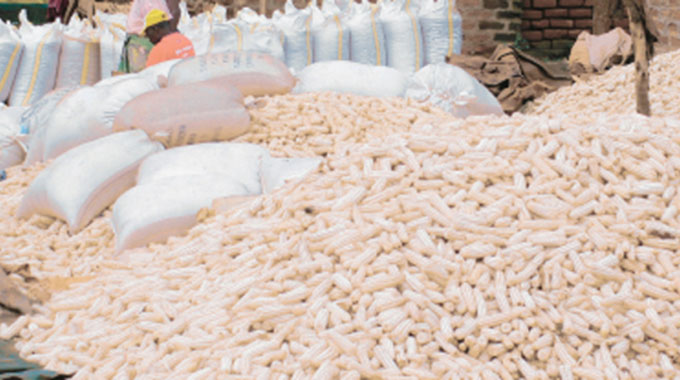
Rumbidzayi Zinyuke Manicaland Bureau
Farmers in Chimanimani are expecting bumper yields following input support programmes to restore food security in the aftermath of the Cyclone Idai disaster.
Many farmers in the district suffered losses when their crops, which had survived a bad agricultural season, were swept away by floods.
The cyclone claimed hundreds of people and left thousands more without homes and injured.
Last year, farmers in the eastern part of Chimanimani district, which covers areas such as Charleshood, Machongwe and Rusitu Valley, started to revive their fields and working to restore their area’s status as one of the most productive in the country.
The district received inputs under the Presidential Input Support Scheme, as well as various input support programmes funded by development partners.
Chimanimani district Agritex officer Shupai Majee said inputs availed to farmers were not limited to maize, as development partners were supporting production of bananas, sugar beans and nutrition gardens.
“We got overwhelming support from a number of our partners, including Oxfam, Care International, World Vision, Jekesa Pfungwa, Tsuro Trust, among others,” he said.
“We also had another programme that was targeting small grains in the drier parts of the district being led by Food and Agriculture Organisation.
“We got sufficient support in terms of seed and chemicals although we did not get enough fertilisers, but our food security prospects are looking good.
“However, due to the high rainfall we received in Chimanimani East, farmers need to apply fertiliser for a higher yield. The area has already received in excess of 1 200mm of rainfall this season.”
Under the Presidential Input Support Scheme, farmers received 10kg maize seed, 50kg Compound D and 50kg of Ammonium Nitrate per household.
Mr Majee said most inputs had been channelled towards Chimanimani East, which generally receives more rainfall, while the western side of the district support was channelled through irrigation schemes.
“The understanding was that since Chimanimani East is the most productive side, farmers there get more inputs and when they harvest, maize is taken to the Grain Marketing Board where it will then benefit the people in the western side of the district, where farming activities do not thrive, through the drought relief programme,” he said.
“Farmers in irrigation schemes like Nyanyadzi, Chakohwa, Nhowe, Tonhorai among others in the west also benefit from the input support, although on a smaller scale.”
Support has also been received towards gardens to support nutrition at household level.
This initiative has been funded by Oxfam, Care International and World Vision in both communities and schools.
“After the cyclone, most of the gardens that lied on the river banks were swept away, so we needed to find better places strategically located so we could establish the gardens there, along with an alternative source of water,” said Mr Majee.
“The package coming from partners, include sinking a borehole and a solar powered pump.”
Mr Majee said Agritex was introducing an initiative for displaced people in Ngangu to grow vegetables in sacks as a way of improving nutrition.
“Ngangu being a town set up, there were no formal nutrition gardens since by-laws would not allow for that,” he said.
“Given the space limitations, we have been trying to pilot sack vegetable production.
“We are doing that for the displaced people in camps. We thought this can be a handy technology that can fit into their setting.”
Government has resumed distribution of food aid under the Drought Relief Programme in Chimanimani West after the initiative had temporarily stopped in November due to erratic maize supply. The programme, which targets the elderly and vulnerable groups in communities is spearheaded by the department of Social Welfare.
Villagers who spoke to The Herald expressed joy at the resumption of the programme which they said would reduce hunger among villagers whose livelihoods had been destroyed by Cyclone Idai.
Mr Samuel Tonje from Zihuu Village said most areas had been affected by drought.
“This year was dry so most of our crops did not do well and because Cyclone Idai damaged almost everything last year, we have not had sufficient food since then,” he said.
“This intervention came at the right time.”
Mrs Evelyn Chiweshe said the programme relieved them from hunger.
“The programme had stopped in November, but we are happy that it has been restored because we were facing hunger,” she said.
“Drought hit us last year and this year we haven’t received much rains. The soils in this area do not have sufficient nutrients to ensure we get a good harvest.”
Ward 17 councillor Lovemore Utseya said most people in the area relied on gardens that had been swept away by the cyclone, hence needed such interventions regularly.
